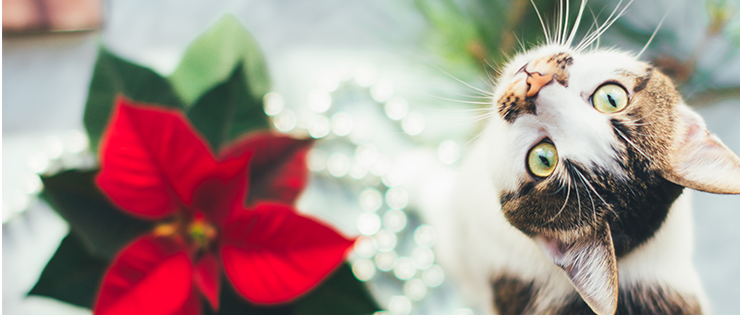
You’re no doubt reading this because you have a cat that you very much love. Cats generally strike us as independent and exploratory pets, which are just a couple of reasons why we love them so much. My cat Pacho, loves going for walks with my dogs and I around our 2 acre property. He climbs trees along the way, sniffs the grass with the dogs and retires by my side, as I work on the garden. Being involved in our lives is essential to Pacho’s happiness, and I am sure many of you can see a similar personality in your cats too.
Despite the independence of our pet cats, their exploratory nature can sometimes be dangerous, with a range of different toxins freely existing around their lives each day. Admittedly, before I began working in my field as a behaviourist, there were many plants that surprised me by how toxic they can be to cats. I have always loved having freshly cut flowers on my table, but knowing how dangerous some of them can be, I now have to be very careful of what Pacho gets his paws and nose into. Sadly, my favourite flowers; a variety of lilies are known to be lethal to cats, with many subspecies causing tissue disruption of a cat’s stomach and oesophagus So, gone are the days where I proudly display them in a vase each week. My vase now just gets filled with water, which Pacho uses as one of his many drinking bowls.
Here are some other beauties, but nasties to watch out for:
- Tulip
- Azalea
- Chrysanthemum
- Rhododendron
- Mistletoe
Other plants known to be dangerous are:
- Aloe
- Marijuana
- Poinsetta (the red leafed plant, you often see gifted at Christmas time)
This is not a full and comprehensive list of all plants that may be dangerous. These are most commonly encountered flora that are known to cause irritation to pets.
If you suspect that your cat has come into contact with any of these plants, then get in touch with your trusted vet. If you are unsure, but your cat is showing any of the following signs of poisoning, take your cat to the vet immediately:
- Difficulty in breathing, and coughing
- Diarrhea
- Dilated pupils
- Vomiting
- Malaise
- Frothing at mouth, or excess saliva
- Disorientation
- Stumbling, unsteady on feet
- Tremors/seizures
- Skin rashes or irritations
- Behaviour out of character
If any of these symptoms present in your cat, remove them from the area immediately, check their vitals such as their breathing and consciousness and contact your vet. It is advised by veterinarians that self-administering any type of antidote to the poison or inducing vomiting is not recommended, and can worsen the state of your cat’s wellbeing.
Whilst household flowers and plants may present harm to your cat, there are a range of household food and items to avoid also. Here is a list of products to keep away from your furry friends:
- Onion and garlic
- Raisins
- Chocolate
- Herbicides, insecticides and rodent poisons
- Human pain relief, such as paracetamol and anti-inflammatories
- Human prescription medications such as cancer medications and antidepressants
- Alcohol
- Caffeine and tea
- Xylitol – chewing gum products
- Some herbs including chives
* Note this is not a full and comprehensive list of dangerous household items.
It is always worth keeping the number and address of the closest 24 hour veterinary hospital with you. If ever faced with the need for urgent veterinary care outside of normal hours, it can be very stressful, and may impact your cat’s health further, as you try to locate the closest clinic that is open.
Whilst most of the time, our cats live happily and healthily by our side, there is no harm, in knowing where there is harm. Being attentive and responsible for your pets helps to not only keep them safe, but significantly reduces the stress you face, knowing that you are doing your best to care for your family, no matter how many legs they may have.